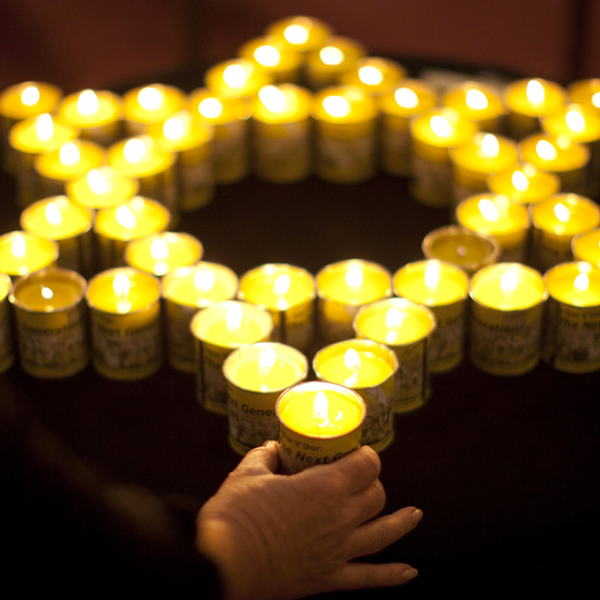*Trigger warning: this piece discusses concentration camps in detail.
As we trudge through barrack after barrack, my eyes become numb to their surroundings. The numbers hurled at me are so large they lack meaning. Every limb aches with cold and exhaustion, but internally, in the parts I can’t shield with hats and gloves, I can feel every bit of my soul being shredded to slivers over and over again.
The snow slices my cheeks and nose like tiny blades, so I keep my head down. I can’t see where I’m going, only where the feet in front of me turn. Eventually, they turn right and the snow finally stops.
Shivering, I brush ice off of my coat and scarf. For a few seconds, I’m too busy basking in the shelter from the wind to realize where we are. I look around, get my bearings and almost immediately lose them again. My stomach lurches and my head begins to spin; I’m standing in a gas chamber.
In expectation of the things I expected to see, I read books and did research. Millions of lives lost, horrific conditions and terrible tragedies filled page after page. I thought I had done what I needed to do in order to be prepared.
Nothing could ever prepare me for that room.
A textbook can give you numbers. A textbook can give you dates, places and even names.
A textbook cannot give you fingernail grooves in a cement wall, still blue from the gas that filled the lungs of the person that left them there.
A textbook cannot give you a stench of death so overwhelming that it becomes suffocating in a bout of cruel irony.
A textbook cannot give you the shriek of a teenage girl as she cries out once, collapses into the strong, gentle arms of a friend and sobs so violently that her tiny frame trembles visibly, even from across the room, as he strokes her blonde hair.
A textbook can give you a false sense of security, like he gave her: “It’s fine; this was all in the past; everything will be OK.”
A textbook cannot give you the repulsive transparency of those words.
A few days pass and, once again, I find myself marching through a camp that reeks of dread and death. One barrack is entirely dedicated to shoes, hundreds of thousands of them at least.
One of the pairs is small enough to fit in my hand.
The snow comes down even worse than it did at Auschwitz. This time, it’s not just bitterly cold snow; it is razor-sharp shards of ice, like someone is trying to make sure that I am aware of just how miserable a place I am in.
I see more things that I’ve read about: rooms full of ovens, the meticulous preservation of the technology and the looming dome on the horizon holding the ashes of innumerable prisoners.
Like before, the readings did the sheer magnitude of gruesomeness no justice.
A textbook does not specify that the ovens were not big enough to fit bodies; they were only big enough to fit emaciated bodies.
A textbook does not forewarn against the nausea and panic that rises in your throat when you realize how recently this all happened, and how easily it could happen again, with how well kept the scene is.
A textbook cannot let your cheeks feel the confusion of frozen tears mixing with fresh ones as they flow freely, stemmed only by the jacket of the best friend, sister, father, or whomever it is that you cling to for help.
A textbook cannot give the Mourner’s Kaddish the meaning it gains when it is said for hundreds of thousands at once.
A textbook cannot explain the sound of another group of mourners, separated from you by a colossal mound of human ash, singing the Israeli national anthem loudly and clearly, nor can it explain the way your own voice rises through you and comes out of a throat raw from tears and a mouth whipped by wind.
When I was 16 years old, I went on the March of the Living, spending one week traversing Poland and one in Israel. I had never before encountered, and never again expect to encounter, anything that comes near the horrors we faced as we walked through one camp after another in Poland: Treblinka, Auschwitz, Birkenau, Majdanek.
I had never before expected, and never again expect, to feel my vocal chords constrict so tightly in an attempt to stop words from passing my lips as they did the day that I was asked to read a passage from Elie Wiesel’s "Night" while standing at the gallows in Auschwitz.
I had never before expected, and never again expect, to dance in the streets of a foreign city with friends and strangers, celebrating the survival of a country against all odds.
Yom HaShoah, Holocaust Remembrance Day, was observed recently. Before I walked through the camps of Poland and the streets of Jerusalem, I had no grasp on the history I was about to experience, both terrible and jubilant. There are many pictures, and thousands of others who have written just as I am writing now, but looking and reading will do no good for someone attempting to understand what lies in those barracks and the profound way in which it affects people all over the world, even today.
Those two weeks were some of the most important weeks of my life. I am not a particularly religious person; I neither found God nor lost faith in God over the course of the trip. I did, however, realize a sense of insignificance in myself, but strength in the community of Judaism, even without the religious parts of the culture. I cannot imagine any other experience being able to connect me to the group with which I traveled like that one did, and those are two weeks which I will never forget.





















